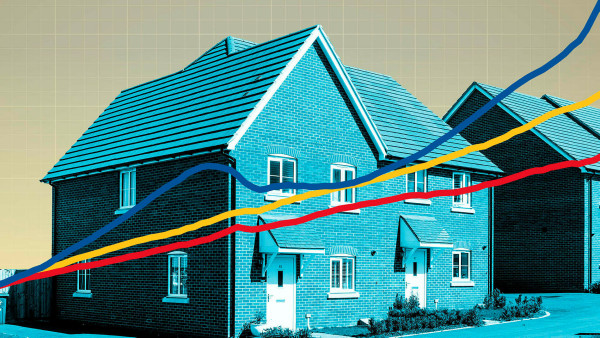

There has been a huge amount of change and uncertainty, from Brexit and Covid-19 to the war now happening in Ukraine. The agenda for politicians, businesses and investors is more customer focused than ever.
This might be because of a resurgence in the desire to care for one another, or simply because news travels at the click of a button, and nobody wants the reputational risk associated with disgruntled clients.
The economy is increasingly segmented into those who are thriving, those who are not doing well and those who are just getting by. We are in a wildly inflationary environment, the by-product of disruption in labour markets, supply/distribution systems and increased money supply has added fuel to the fire and it is affecting everyone.
Construction material prices grew by more than 20 per cent in the past year. Average house prices are almost £50,000 higher than at the onset of the pandemic, meaning that houses earned about as much as an average person (circa £25,000 a year) over those two years.
Meanwhile, asking rents grew by 11 per cent over the past year according to Rightmove, and we all know what is happening with gas prices.
The shortage of available housing is being compounded by inflationary pressures. It means that prices are likely to remain strong and continue to rise. This is unlikely to change anytime soon due to higher costs of materials and labour, a backlog of planning applications and a growing burden of rules and regulations for property developers to contend with.
The good news is real estate tends to perform well in an inflationary environment, and it is certainly better than putting your money in a savings account where the best you can expect for a five-year fix is 2.4 per cent per year – the best offers available mean locking in a five-year loss.
Social changes
Socially, it is difficult to neatly summarise the complex social trends and changes in a post-Covid or mid-Covid world. Long-term urbanisation was followed by an exodus from cities.
Rising loneliness and health trends also play a part alongside longer term, more evident population and generation-wide shifts. We have an aging population and people settling down later, if at all.
Affordability constraints are mixed with long-term rising living standards. The end result is growing demand for rental housing. People living longer also increases the need for yield-focused investments from pension funds and individuals planning for retirement.
There is a growing generational divide in ideals and resources; boomers, millennials and generation Z seem divided both in their attitudes to the world’s problems, what resources they have at their disposal, and how they want to or are able to access real estate.
Technological advances, innovation and data are opening up access in the property market, as well as increasing efficiency and quality for cost, often at little or no cost to the user.
That positive externality will be really powerful in the coming years – it already is – and it is important that it is used for good.
We have seen many fascinating ideas that turn out to be fuelled by metaphorical kool aid, from WeWork’s valuation through to real-estate-related NFT projects for which, frankly, it is very difficult to see how NFTs add any material value to the project. Going forward, being savvy about what is ‘value-add’ tech and what is not will be important.
Regulation and the environment
From a legal and regulatory perspective, we have seen continued growth in the reach of regulations, thanks to the government’s desire to make the housing sector more professional. The result is a shift in the balance of power from smaller investors and sideline landlords to homeowners at one end, and institutional investors at the other.
This aligns with the more consumer-focused political agenda I mentioned earlier. We now have 168 laws and regulations governing property and its management. Notably, many of the newest regulations have focused on the environmental performance of buildings – which brings me onto environmental changes.
Our awareness has grown around the key areas of risk relating to the environment. The UK’s legally binding commitment to achieve net zero by 2050 means that now sustainability is no longer a ‘nice to have’.
Net zero is a legally binding national target that means that the UK’s total greenhouse gas emissions should be equal to or less than the emissions the UK removed from the environment.
It requires first to improve energy efficiency, for example reducing energy usage, then increase renewable usage, then finally to offset any remaining carbon, for example through planting trees to absorb carbon dioxide from the atmosphere.
This legal obligation is showing up in the form of new rules, regulations and best practices affecting all sectors that contribute to emissions.
The urgency to address the sustainability agenda has been highlighted by the high impact, low probability shock of Covid-19, which has strengthened the case for prioritising people and planet alongside profits and illustrated the power of collective action to tackle global problems.
The low environmental efficiency of buildings has been highlighted by the tragedy and violence in Ukraine, and the associated impact on energy markets.
So, what are the risks? Firstly, there is physical risk, for example flooding risk. Secondly, there is transition risk, where buildings become obsolete or fall in value due to environmental changes or regulations around the environment.
A great example of this is the impact of minimum energy efficiency standards on rental houses with EPC ratings below E, which can no longer legally be rented out.
Real estate contributes 40 per cent of global carbon emissions, and in the UK reductions to real-estate-related emissions have flatlined, so the industry is a really important part of our collective ability to save the planet.
With all of these trends and changes, while property assets remain attractive, the old ways are broken.
As a result, we need to reconsider and reshape all aspects of investing, from ownership structures to sustainability and impact.
Anna Clare Harper is director of real estate technology platform IMMO



